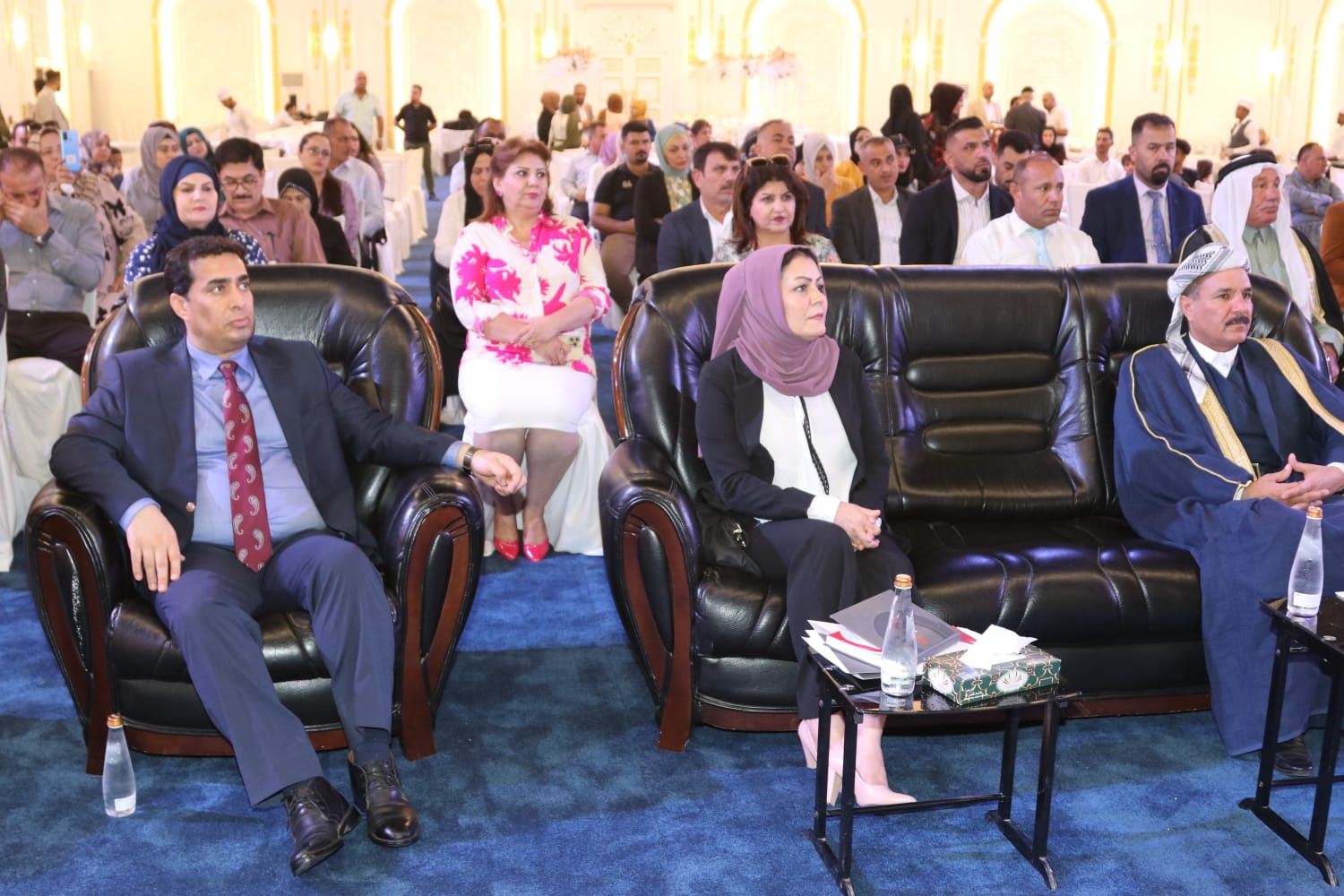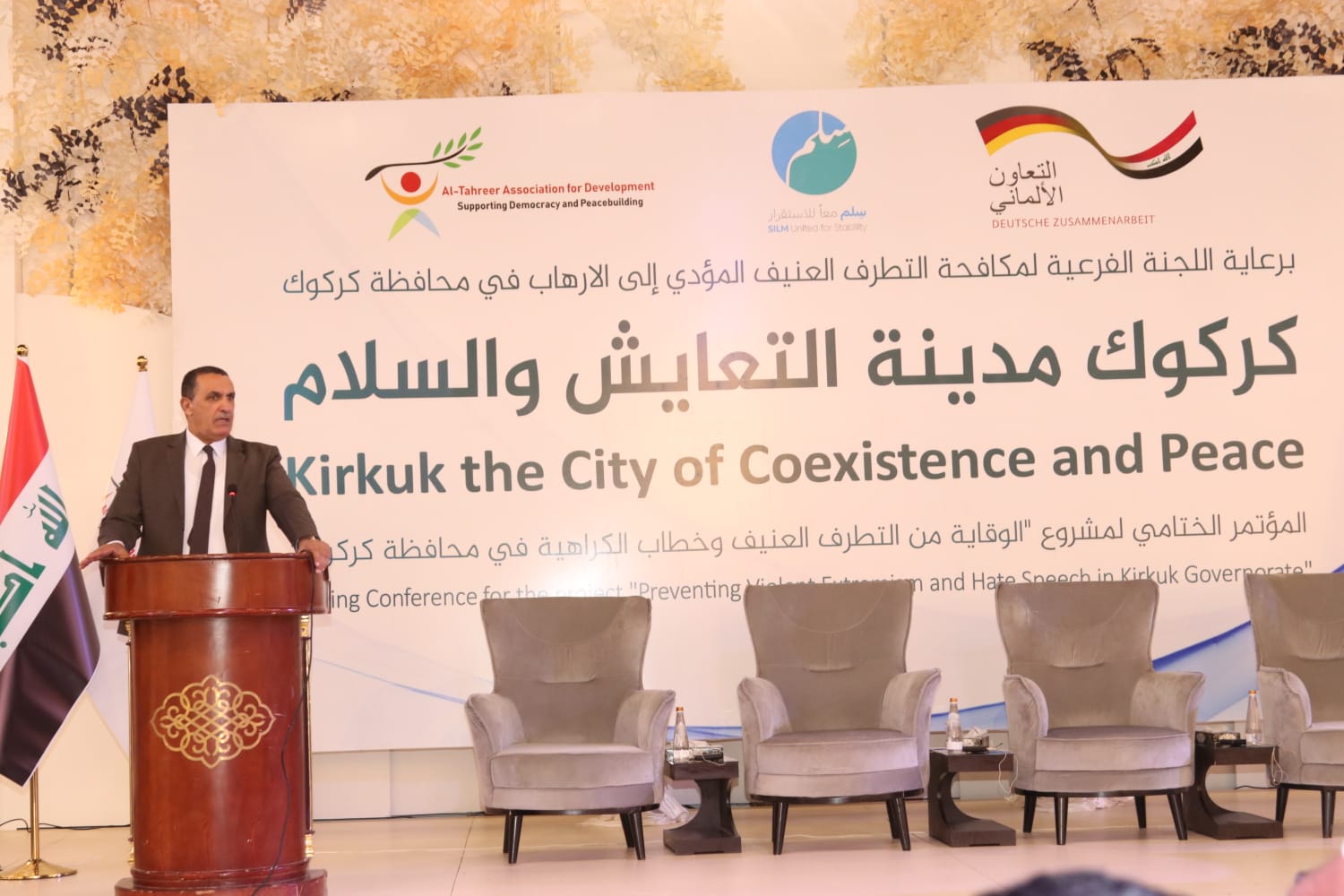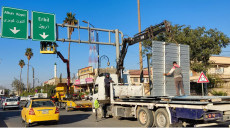The Kurdish and Turkmen activists in Kirkuk Northern Province criticize the closing ceremony of an eight-month project of two organizations, which is dedicated to the youth of Kirkuk and aims to spread peaceful coexistence between the local communities, because the title of the project does not contain Kurdish and Turkmen.
According to the permanent constitution of Iraq, Arabic and Kurdish are the two official languages of the country, and both Turkmen and Syriac are official languages in the administrative units where those ethnicities live alike the multi-ethnic city of Kirkuk.
The German Cooperation Organization (Deutsche Zusammenarbeit) and the Tahrir Foundation for Development, a local non-governmental organization NGO, organized the closing ceremony of a project for peace and peaceful coexistence in Kirkuk on Sunday, June 27, in the presence of senior officials of the city, including Rakan Al-Jibouri, the acting governor.
The banner of the event was written in English and Arabic only, which sparked criticism from Kurdish and Turkmen activists on social media platforms.
“Unfortunately, last night when I saw the title, which talked about peace and coexistence, written in Arabic (only), (while) Turkmen, Kurdish and Syriac languages were missed, I was worried,” Sabria Hikmat, a Turkmen activist, said.
“The organizers of the project should have taken into account the situation in Kirkuk,” she added.
“The governor should have criticized the project supervisors for the language discrimination and said they should start here... If the governor had criticized the situation, it would (for sure) have improved,” she said.
The governor of Kirkuk should have criticized the project supervisors for language discrimination
The northern oil-rich city of Kirkuk, located 238 kilometers north of Baghdad, is an ethnically mixed province for 1,7 million Kurds, Sunni and Shiite Arabs, and Turkmens. It has long been at the center of disputed territories between Baghdad and Erbil.
Kurds were holding the senior position in Kirkuk including governor of Kirkuk up to October 2017 when the Iraqi troops ousted the Kurdish forces following declaration of victory over the Islamic State in Iraq and Levant ISIL.
"Unfortunately, we often see conferences and meetings held in Kirkuk under the title of coexistence, but the organizers of these activities marginalize the principles of coexistence," said Hemin Hasib, a Kurdish civil activist and lawyer.
According to him, the first step towards coexistence is to show respect for the local communities and their languages.
“The absence of languages other than Arabic on the flex is a twofold violation. First, it is a violation of the content of the work, which is coexistence and peace. Besides, Kurdish and Arabic should be used together, along with other local languages of the city, such as Turkmen,” Hasib said.

He called on the organizing committee and the Iraq-German Coordination Committee as the sponsor to explain and apologize, in order to show their impartiality, "because respect for culture is an important pillar of coexistence ... Without recognition and respect for each other's culture and language, its impossible to talk about coexistence and peace.”
The German Cooperation Organization and Tahrir Development Agency have been launching the project for eight months through courses and workshops, which aims to reduce violence and promote peace and coexistence among the youth of Kirkuk.
Hasib insisted that the organizers of the event to apologize, while Milan Ali, in charge of projects at the Tahrir Agency for Development, had no apology except an explanation.
Ali, through KirkukNow, said that they are aware of the protests against the article, which is written only in Arabic and English, and stressed that he has been waiting for a media to explain since last night.
“Arabic is the main language in Iraq and we must write it in the main language. If we had written it in Kurdish, it would have been written in Turkmen and Syriac as well then the script would have messed,” Ali explained.
“English was used because we are an international organization.”
If we had written in Kurdish, it would have been written in Turkmen and Syriac, then the writing would have been messed
Back in 2018, the Turkmens and Arabs each have got each three seats of the 12 parliamentary seats of Kirkuk and the rest six has gone to the PUK, one of the key Kurdish parties and stakeholder of the Iraqi Kurdistan Regional Government KRG along with its decades’ ally-competitor Kurdistan Democratic Party KDP which boycotted elections in Kirkuk.
In October 10th general elections, Turkmen candidates have won two seats while the Arabs have got four seats. PUK has lost half of its seats, 2 to KDP and one for the New Generation.
Currently, the Iraqi army, local and federal police, Brigade 61 of Special Forces along with Shiite paramilitary of Popular Mobilization Forces PMF, are under Kirkuk joint operations’ command, an umbrella for the security forces running the security of Kirkuk province.
The Iraqi constitution does not say that Arabic is the official language in Iraq, but says "both Arabic and Kurdish are two official languages in Iraq.
Regarding other languages, including Turkmen and Syriac, the constitution states that "they are two other official languages, but in the administrative units where they constitute the majority of the population.
Accordingly, in Kirkuk, along with Arabic and Kurdish, which are the two official languages of the country, both Turkmen and Syriac must be used, as the Turkmens and Christians make big part of the city.
Samal Jabar Barzanji, an Islamic scholar who participated in the event, told Kirkuk Now, “I spoke to the organizers of the project and told them that the back flex should have been written in all four languages of Kirkuk.”
Rakan Saeed, the acting governor of Kirkuk, explained the importance of promoting peaceful coexistence of ethnic and religious groups in the province and considered it a good step, but did not address the missing of the local language in the banner.
KirkukNow tried several times to speak to Ali Hammadi, assistant of the governor who accompanied him governor in the event, but he did not respond.
A source in the Kirkuk administration, who preferred to stay anonymous since he is not authorized to speak to the media, said: "The activity was not organized by Kirkuk administration, and the organizors should have taken into account the presence of different languages.”
"We live together in fraternity and peace in this city and for this purpose, the Kirkuk administration last year warned all government offices that each sign must be written in all four languages of Kirkuk," the source said.
The administrative order, a copy of which is with KirkukNow, was circulated to all offices last September.
In December, the Kirkuk administration decided to remove all new signs in the city because they were written only in Arabic and English, sparking widespread protests.
Although the signs were supposed to be replaced in all four languages soon, there is no practical step yet.






